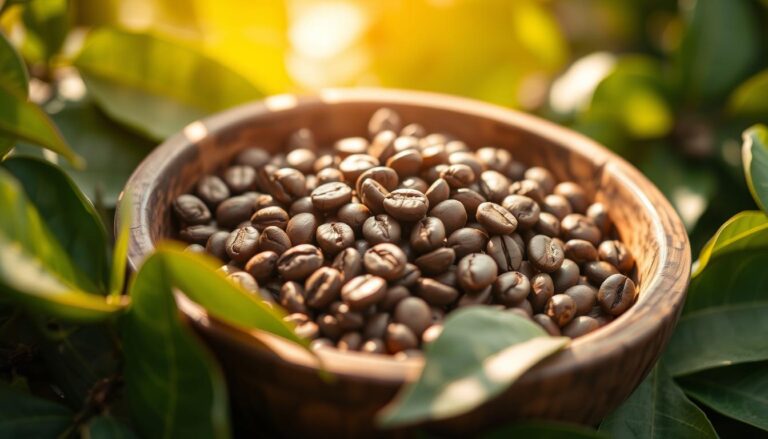A Journey into Arabica Bean Coffee
If you’re like me, someone with a passion for coffee, perhaps you are familiar with the highly-praised Arabica bean coffee. This type of bean is appreciated because of its rich and smooth flavor, making it popular among numerous global caffeine consumers.
Now, what exactly sets these particular beans apart?
We will explore the captivating universe of Arabica bean coffee and discover why it is valued for every taste.
The Origin of Arabica Bean Coffee

Arabica beans are a product of the Coffea Arabica plant that originally grew in Ethiopia’s highlands. They are among the earliest coffee species to be grown, attributing them an important role in coffee’s extensive past.
Also, did you know that more than 60% of global coffee production is linked to Arabica beans showing their sustained appeal? Interesting, right?
Arabica plants usually flourish in particular weather conditions, often at elevated levels. Their growth location gives them a distinct taste which is commonly described as sweet, featuring subtle hints of fruit and sugar.
Have you ever noticed a mild fruity aroma in your coffee cup? That’s one of the defining features of Arabica beans.
Why Arabica Bean Coffee Is a Favorite
One of the main reasons people love Arabica bean coffee is the smoothness of its flavor. In comparison to other varieties of coffee that could potentially be bitter or severe, Arabica provides an experience that is more balanced and not as acidic.
By drinking a well-brewed cup of Arabica coffee, you encounter a rich mix of sweet, fruity, and nutty flavors.
I’ve always found that Arabica bean coffee is easier to enjoy black, without needing to mask its flavor with milk or sugar. Its natural sweetness makes it the best option for those who like their coffee mild and not too strong.
If you’ve been on the hunt for a type of coffee that offers flavor without overwhelming bitterness, you should try Arabica out.
How Arabica Beans Are Grown
Arabica bean cultivation is not as easy as it seems. Since the plant is delicate, it requires suitable climate conditions, altitude, and care. Usually, Arabica plants are cultivated at heights ranging from 2,000 to 6,000 feet where the temperature tends to be cooler with increased rainfall quantities.
The height of a place greatly affects the taste of coffee beans. Arabica beans, for example, grow slowly in colder weather conditions which gives them ample time to produce more sugars. This results in their sweet and intricate flavor that is widely loved.
Yet on the downside, this makes Arabica beans prone to pests and diseases hence increasing difficulty while growing these as opposed to other kinds of coffee.
The Brewing Process for Arabica Bean Coffee
You may be curious about how to make the perfect cup of coffee from Arabica beans. The good news is that these beans have a lot of versatile and can be made through various methods.
Whether you prefer using a French press, espresso machine, or pour-over method, Arabica beans adapt well to different brewing techniques.
One of my favorite ways to enjoy Arabica coffee is by using a pour-over method. This way, I can better manage the temperature of water and time for extraction which enhances the subtle flavors in beans.
If you’re just starting with homemade coffee, trying Arabica beans would be nice because their forgiving nature makes it easier to brew a tasty cup, even if you’re still learning the ropes.
The Health Benefits of Arabica Bean Coffee
Apart from its tasty flavor, coffee made from Arabica beans brings many health advantages. Are you aware that Arabica beans have a higher quantity of antioxidants compared to Robusta beans? These antioxidants aid in reducing inflammation and can support an improved way of living.
Moreover, Arabica beans contain less caffeine, which makes them an excellent option if you’re sensitive to caffeine but still desire that morning boost.
When you drink coffee but not too much, it can be good for your health. It may help the brain work better and make the body stronger, also lowering the chance of getting some diseases like Parkinson’s and Alzheimer’s.
If you pick Arabica bean coffee to drink, it is not just a tasty beverage but also something that improves your health a bit more.
How to Choose the Best Arabica Beans
There are a lot of choices available for Arabica beans, and it can be confusing to select the best one. I suggest always going for freshly roasted beans that come from reputable sources.
The perfect option would be to purchase beans that underwent a roasting process in the last two weeks, this will ensure the flavor is at its peak.
When you buy Arabica coffee, it’s important to notice the roast level. Light roasts usually bring out the natural flavors of the bean and show its fruity and floral notes more clearly. But dark roasts have a stronger, richer taste.
They don’t focus much on showing the original features of the bean. Trying different roast options is a top method to discover your preferred type of Arabica bean coffee.
To Wrap It All Up…
Coffee from Arabica beans is much liked by coffee enthusiasts and rightly so. The bean provides a refined, deep taste with an extensive range of flavors which makes it the perfect choice for those new to drinking coffee as well as regular consumers.
No matter if you are preparing it at your home or having a cup in a nearby café, Arabica coffee always satisfies you completely.
So, the next time you’re looking for a flavorful, less bitter coffee experience, I suggest you give Arabica bean coffee a try. You might just find yourself hooked on its unique and delightful taste.






